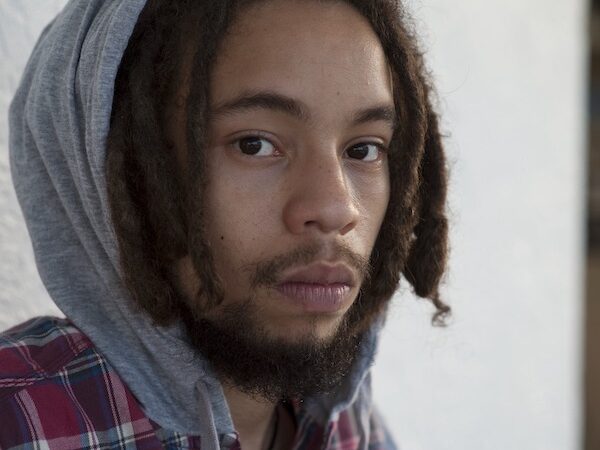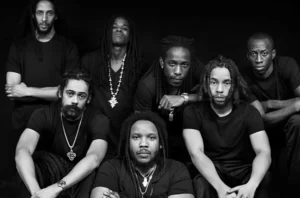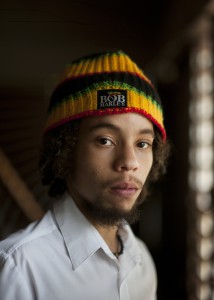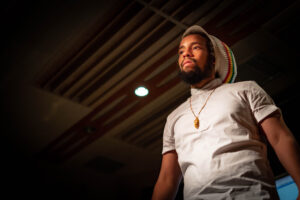
Memories of a Young Lion
“I don’t really walk around bragging about what I can and can’t do,” Jo Mersa said the first time Boomshots interviewed him, during the summer of 2013. Just the night before he had shared the stage with his father Stephen “Ragga” Marley and his uncle Damian “Junior Gong” Marley, spitting his rapid-fire lyrics to a capacity crowd at London’s Indigo O2. “I don’t talk about it,” he said. “When you hear, you hear it — and you get weh you get.” Video and Full Story After The Jump…
True enough, I’d seen Stephen Marley’s firstborn son before I heard him.
Fleeting impressions flash through one’s mind in the immediate aftermath of a loss. The preteen boy with shaggy blonde hair and baggy basketball shorts, banging out a beat on a studio drum kit while his father cracks a smile. The young lion chilling backstage with his brothers and sisters, planning their next move. The new father checking on his baby daughter and her mom after finishing a performance.
I write these words amidst the pain of losing a bright young man, a son, a father, a brother, a person who loved music so much, who had so much more to give the world and to experience for himself. Joseph Mersa Marley was found unresponsive in his car on December 27, having suffered an apparent asthma attack. He was 31.
These days humans process shock and sadness virtually, using our trusty smart devices to help numb the impact. For the last 36 hours the internet has been flooded with messages of mourning and condolence for Jo Mersa. His aunt Cedella and his grandmother Rita posted blank white squares on social media without words. Because what use are words at times like these? His uncle Rohan posted a video of himself sitting in a car with Joseph’s younger brother Yohan—who collaborated with Jo on the song “Brickell (When Tears Fall)”—listening to a track from Jo’s 2021 EP Eternal. “Guess who’s coming home? Fresh offa the road,” he sings, sounding triumphant. “Just burn down Rome. No more will I roam.” His family has made no other statement thus far.
Just a few weeks ago Stephen Marley was in great spirits, having returned to the Welcome to Jamrock Reggae Cruise for the first time in three years. Stephen’s band sounded amazing as ever. The new music he shared privately, from an unplugged album to be called Old Soul, was fresh and powerful and personal and worldly wise. Stephen had celebrated his 50th birthday this past April 20, and spoke with amazement about the feeling of being a grandfather. I looked forward to seeing Joseph, but didn’t find him on board this year.
Stephen was 19 years old when Joseph was born in Jamaica, shortly before the 1991 release of Jahmekya, Ziggy Marley & The Melody Makers’ sixth studio album. His mother, Kerry-Ann Smith, is the younger sister of an iconic figure in Jamaican culture, Carlene the Dancehall Queen. “I was there when you were born,” Carlene wrote on Instagram. “It was one of the most joyous moments in my life. My family is so heartbroken right now no words can express.
At the time of Joseph’s birth, The Melody Makers were young reggae superstars—Bob’s eldest sons Ziggy and Stephen and their big sisters Cedella and Sharon—already had two Grammy awards under their belts at that point, and had toured the world a few times over. Besides becoming a new father, Ragga was stepping up musically at the time, doing more writing and even singing lead vocals on some tracks from the new album.
Joseph was four years old by the time I first interviewed his dad for a Melody Makers feature in the October 1995 issue of VIBE. In another video interview recorded not long after that, Joseph sounds like an intelligent, well-mannered boy enjoying a happy childhood. He speaks about how much he loves jumping on the trampoline with his brothers and feeding carrots to his pet rabbit.
“My father is a musician like my grandfather Bob Marley,” Joseph states proudly at age six. “Today I’m going to make a song in the recording studio with my daddy,” he adds, bursting with excitement. “We sing together.” Stephen sits next to his son, playing what looks like one of his father’s guitars as they run through an acoustic version of “Love and Inity,” a Damian Marley tune Ragga produced for Junior Gong’s debut album Mr. Marley. “Love and inity is what we need upon the street,” they sing, wearing matching headphones, Stephen smiling brightly while little Joseph looks big and serious. “Got to get a place fi ghetto youths fi rest them feet.” Stephen lets Jo takes the punchline himself, and he nails it every time: “Beca’ they trod the rocky road.”
Joseph took music seriously from an early age and went on to study studio engineering at Miami Dade College. His father was tremendously proud of his son’s passion for music. As the old saying goes, the apple did not fall far from the tree—or as Damian Marley once put it, the orchard.
To say that Joseph grew up in a musical family would be a massive understatement. For the Marleys reggae music is more of a calling than a career choice. In some ways this can be an advantage—Joseph’s uncles and aunts were always there to support his dreams and nurture his talent. At the same time, maintaining the Marley legacy is—in the words of a Buju Banton song—not an easy road. To make music in this family means holding oneself to the highest standards—musically, spiritually—and to devote one’s life to living up to a legend. Young Joseph accepted this challenge humbly and wholeheartedly.
In the autumn of 2012, while Ragga was working on his fourth solo album, Revelation Part II: The Fruit of Life, he invited Boomshots to his Florida studio The Lion’s Den to listen to some works in progress. That was the first time I heard Jo Mersa’s artist name—at the time he was going by his first and middle names, proud of his family legacy but perhaps seeking to make a name for himself. “I’m an artist too,” he told me at the time. “I’m doing my own music now.” It was not until the following year in London that I heard tracks like “Bad So” and “Comfortable,” which would appear on Jo Mersa’s debut EP later in 2013. His sound was fresh and youthful, and unabashedly bashment.
That July evening in London, Jo Mersa sat in the same Basing Street recording studio where his grandfather had recorded masterpieces like Exodus and Kaya more than thirty five years earlier, speaking about how he balanced his dancehall influences with his mighty family legacy.

Ghetto Youths International
Reshma B asked him about the show the night before, asking what it felt like to perform alongside his celebrated father and his uncle Damian, who had become a worldwide superstar on the strength of his landmark 2005 album Welcome to Jamrock. Had he felt any pressure stepping on the big stage? “You kinda put the pressure right now,” Jo said with mock irritation, “cause I wasn’t thinking ’bout it at that moment.” Then he broke into a laugh and a big toothy grin. “No, it was all lovely. A family vibe, man. Same way it would be at the studio when we’re all together. Just free.”
How could he explain the experience of growing up in this unique family? Jo said that if you look at live footage of The Melody Makers in concert, at a certain point in the show you might see some young kids running out on stage. “I am one of them,” he said calmly, without a trace of braggadocio. “My cousin Daniel, my cousin Justice, my brothers Yohan, Stephen, Sasha, Summer—the whole of them. We do music,” Jo said, speaking for all the Marley grandkids. “Just keep your eyes out and your ears out,” he said. “And you will always hear a familiar sound.” Then he paused and added, intriguingly. “Or who knows? That’s the whole surprise of it.”
Asked whether he loved dancehall more than reggae, Jo thought carefully before answering. “No,” he stated emphatically. “I love dancehall just how I love reggae.” Then he paused. “Well, not just like—me love reggae more… But I still have a love for dancehall which I can’t ignore.”

In years to come, that love would come to the fore on scorchers like “Rock and Swing” as well as standout cuts on successive volumes of the Set Up Shop series issued by the Ghetto Youths label that was started by his uncles and his father to champion rising talent from Jamaica.
In 2018 Jo Mersa had the chance to collaborate with his uncle Damian aka Gongzilla for the first time on a song called “Point of View.” Aside from spitting fire bars, Zilla worked with Jo on the hard-hitting track, an exacting process that was followed by a final mix by Stephen “Ragga” Marley himself. “You done know Pops is very specific like that,” Jo told me with a smile. “Him and Uncle Damian are both very specific.”
The song marked a sort of coming of age for young Joseph in more ways than one. The lyrics were inspired by an atrocity committed against a little girl that made headlines that year in Jamaica. Having recently become the father of a baby girl himself, Jo was distressed to hear of the rape and murder of Yetanya Francis, also known as “Princess,” in Kingston’s Arnett Gardens community. “Just reading about it upset me so much,” Jo recalled. “I was like, ‘Bwoy if that was me I’d probably go crazy…’ Them things can drive somebody insane. You bring a life into this world, and somebody just violate them so many ways. It’s not like we’re telling people to turn to violence, but me feel like me woulda kill somebody.” The words took me by surprise, especially coming from someone who usually seemed so kind. Thankfully Jo was able to channel these strong feelings into music. “Being behind a mic is like being behind a gun for us,” he said.

When I spoke with Jo prior to the 2018 Jamrock Cruise, he was excitedly preparing for his solo set. “I cannot wait,” he said by telephone from Miami. “As we speak, me and my bandmates are going over the setlist. I want to make an impact. I want the people to know say this is Joseph now—and this is what you’re going to get!” During that call his passion was palpable.
“Jo, you beat yourself up too much in the studio,” Christopher Ellis once told him. Chris is a fellow Ghetto Youths artist who shared more than a few sessions with young Joseph. Chris also happened to be the son of reggae legend Alton Ellis, so his advice came from a place of wisdom and love. “Sometimes you have to know how to make it come natural,” Chris told Jo, who recalled the conversation to me with a laugh.
“Ah paradise, deh studio ah voice,” Jo sang that same year on “Hurtin’ Inside,” a song that speaks to his legacy as the Tuff Gong’s grandson. The song is based on a Bob Marley tune, interspersed with new lines like: “Cold days, stressful nights. More time I feel like light a stick of dynamite. instead I light my spliff and then me feel alright.” While staying faithful to the original, Jo succeeded in making the song his own.
“I guess you could say it’s my version,” he told me that day. “It was influenced by grandpa’s song, so I paid my respects. Then I came and switched it up with my own twist.” At the end of our call Jo spoke of his plans for the future. “I just want to continue making music from the heart,” he said, “and make it touch people’s heart, and them ear, and them foot!” (Check out this playlist of Jo Mersa Essentials to revisit his work.)
Joseph devoted himself to the fulfillment of his musical goals, diligently perfecting each song, thinking and rethinking every detail like his father taught him.
His 2021 EP Eternal, released two months after his 30th birthday, was a creative breakthrough. The EP’s rugged opening track, “Guess Who’s Coming Home,” perfectly bridges the gap between Jo’s roots-rock-reggae lineage and his dancehall passions. The project also featured collaborations with lyrical heavyweights Busy Signal and Kabaka Pyramid as well as a track produced with his cousin Skip Marley. Boomshots premiered the subsequent Eternal “visual mixtape,” which included video vignettes as well as special remixes and dubplates including bangers with fellow Ghetto Youths artist Black Am I and Jo’s uncle Zilla. At that moment, Jo Mersa was at the top of his game.
“I’m living my life but the struggles ahead,” Stephen Marley sings on “Revelation Party,” a song from his album Revelation Part 2: The Fruit of Life. “See I can’t look back now, but I cannot forget.” The song began as an acoustic father-and-son collab with Joseph. For the final album version, Ragga brought in a full band with harmonies sung by his sister Cedella. “Not lost, we found our way,” Jo spits on his verse. “Not losing, can’t lose faith.”
In a video series produced by filmmaker Stephanie Black to commemorate Stephen’s album, he spoke about the meaning behind the song. “Regardless of the troubles and the struggles, celebrate your life and give thanks to be here,” he said. “The song was similar to even when my father say ‘Forget your sorrows and dance…’ It’s the same thing. Just put the struggle aside and enjoy yourself.”
Joseph remembered the exact moment when he came up with the perfect verse for this collaboration with his dad. “I was just voicing it,” Jo said, “and then it was one point, him tell me me have it.” Explaining that his verse was sparked by a part of his father’s melody, Jo sang the melody back. His father looked at him and smiled. Jo maintained his gaze on the camera, making sure his meaning was properly conveyed. “It’s a significant point in my life,” he said of the paternal collaboration. “That’s the stamp of approval to me.”
“Once a man and twice a child, and everything is just for a while,” Bob Marley sang on “Real Situation,” a track from Uprising, the final album released during his lifetime. The legendary King of Reggae flew away home in 1981, having spent only 36 years on planet Earth—five years longer than his grandson Joseph.
It’s phenomenal how some people manage to pack so much into a brief span on the physical plane of existence. People like that have a way of living on beyond the flesh. “Our parents were such positive people,” Stephen said. “The integrity of their work lies within their words and them music, and how the people relate to this music. That same integrity has been passed on.”
![]()

Photo by Kriss Kofi
Lead Photo by Brian Cross
Follow Boomshots on Instagram
Subscribe to Boomshots TV
Follow Boomshots on Twitter
Follow Boomshots on Tumblr


